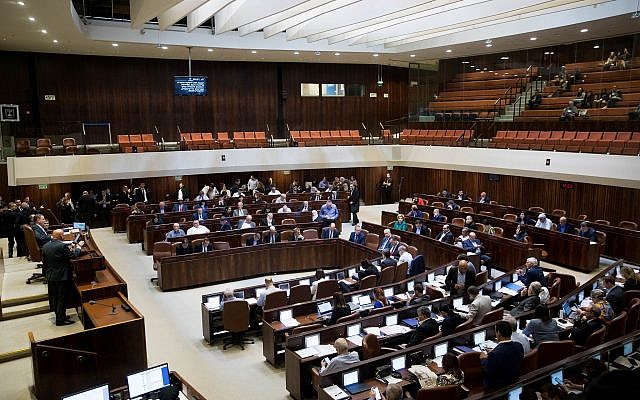Elections for the 21st Knesset are scheduled for Tuesday, April 9, 2019, and while most who follow the Israeli political scene are familiar with the major parties competing in Knesset, few are aware just how many parties are registered to compete for the 120 seats in Knesset. In fact, the upcoming election is a record breaker, even for Israel, with 47 parties registered for the upcoming elections.
The time for registering parties for elections has passed last Thursday, 21 February at 10:00PM, fifty-five days ahead of elections, as dictated by law. The parties that were still negotiating were given an extension, with the Central Elections Committee closing its doors at 11:59PM.
The official lists were presented to the chairman of the Central Election Committee, Supreme Court Justice Chanan Melzer. Each list requested a letter(s) from the Hebrew alphabet which will represent their list on the ballot slips on Election Day. The new parties may compete for yet-unused letters, approved on a first come, first served basis.
According to the information released by the Israel Democracy Institute, the previous record for the number of parties competing was set in the 2009 elections, when there were 33 parties vying for a place in the Israeli parliament.
Interestingly, but not too surprising, with all these parties competing, 60% of the popular vote is expected to be split between Likud and Blue & White. The remaining votes will result in an additional eight-to-ten parties entering Knesset, with the others having to place their political aspirations aside for the coming years.
There are some 6,300,000,000 eligible voters and Central Elections Committee officials report that approximately eight million ballot slips will be printed for each of the 47 parties, totaling an impressive 376 million ballot slips.
Some of the agreements made:
Degel Hatorah and Agudas Yisrael
They are running under the name Yahadut Hatorah as was the case in the outgoing Knesset. Tensions ran high between them in the municipal elections, and they split in some of the races, but they managed to put differences aside and join ranks for the common good in the national race.
Yesh Atid & Israel Resilience
These two parties, with the Israel Resilience party being the new party launched by former IDF Chief of Staff Benny Gantz, threatens to unseat Likud and Prime Minister Binyamin Netanyahu. The Israel Resilience also includes former IDF Chiefs of Staff Moshe Ya’alon and Gabi Ashkenazi. Talks with former Yisrael Beitenu MK Orly Abekasis-Levi broke down and her Gesher party will run on its own in the upcoming election. Some polls show she will not earn enough votes to enter Knesset but she remains confident she will.
Bayit Yehudi, Ichud Leumi & Otzma Yehudit
Bayit Yehudi and Ichud Leumi already partnered in the previous Knesset elections. In the last election, Otzma Yehudit ran with the Yachad party headed by Eli Yishai, and failed to get into Knesset. The additional of the controversial Otzma Yehudit party is only until Election Day, as the parties agree it will break off and serve on its own in Knesset, independent of Bayit Yehudi and Ichud Leumi, which will remain united. Yachad’s Eli Yishai was unable to join as he demanded the ninth place on the lineup and a guarantee to serve as a cabinet minister if the party is given three cabinet posts in the next coalition, a demand which was not met, hence he too is running on his own. His party running many fear will cost the right-wing badly-needed votes as was the case in the previous elections, when 124,984 votes went into the trash.
Arab Parties
The Arab List of the outgoing Knesset has disbanded and the Ta’al party headed by MK Ahmed Tibi signed an agreement to run with the Israeli Arab/Jewish Hadash party. The other parties from the Arab List, Balad and Ra’am are running on their own.
Most parties will not enter the Knesset, and most will never be known to the majority of eligible voters. However, the race will remain a tight one with a most recent poll showing that Blue & White beats Likud in the popular vote, but with the majority of Knesset remaining aligned with the right-wing bloc, and the chareidim announcing they will not enter a government with Yair Lapid, the party may not be able to form a coalition government even it is takes the election. Such a situation may compel the presidential mandate being given to the second-place party, Likud, and PM Netanyahu would then have an opportunity to establish his coalition. This is what occurred when Tzipi Livni headed the Kadima party, taking the popular vote but unable to establish a coalition, leading to Netanyahu setting up his coalition government.
(YWN Israel Desk – Jerusalem)











